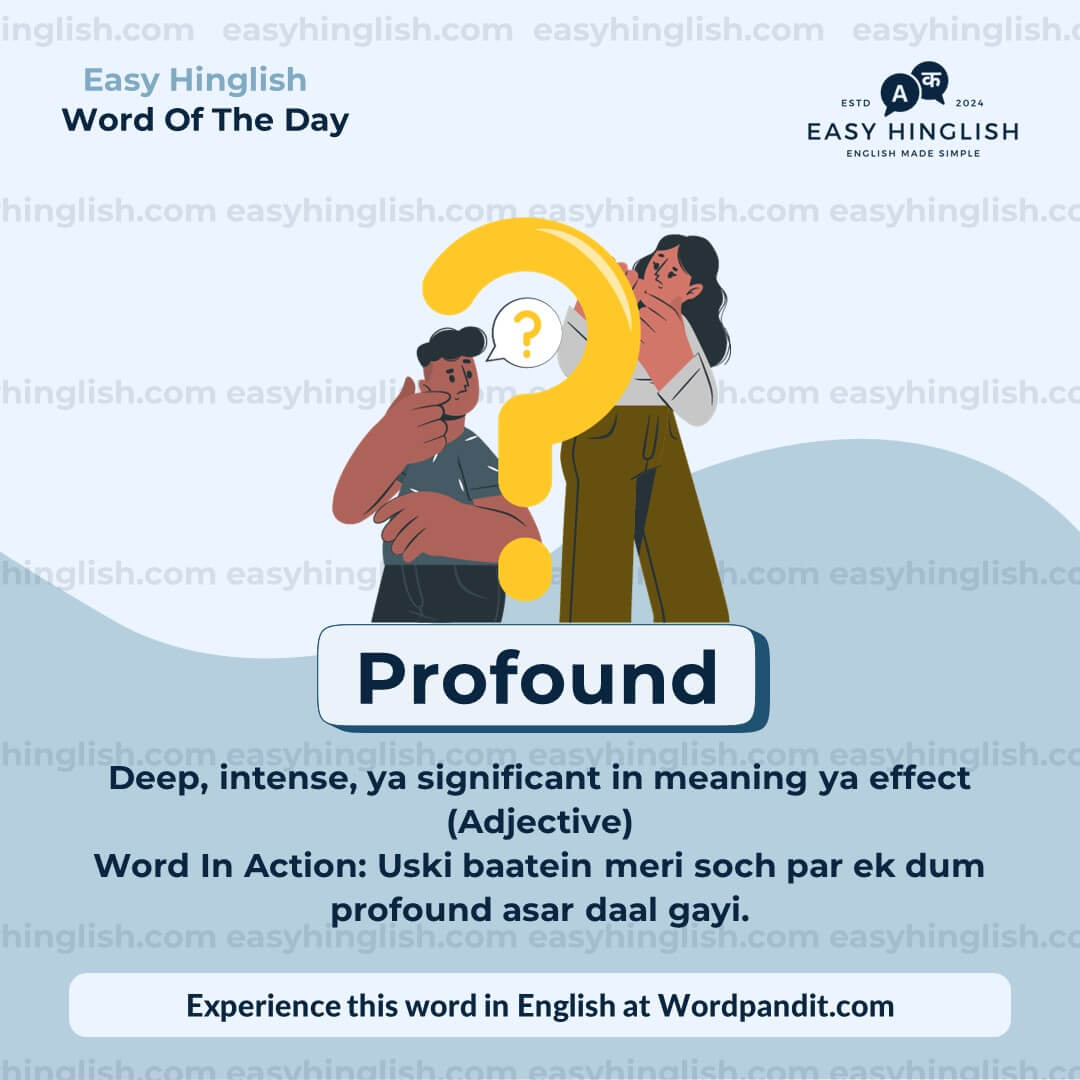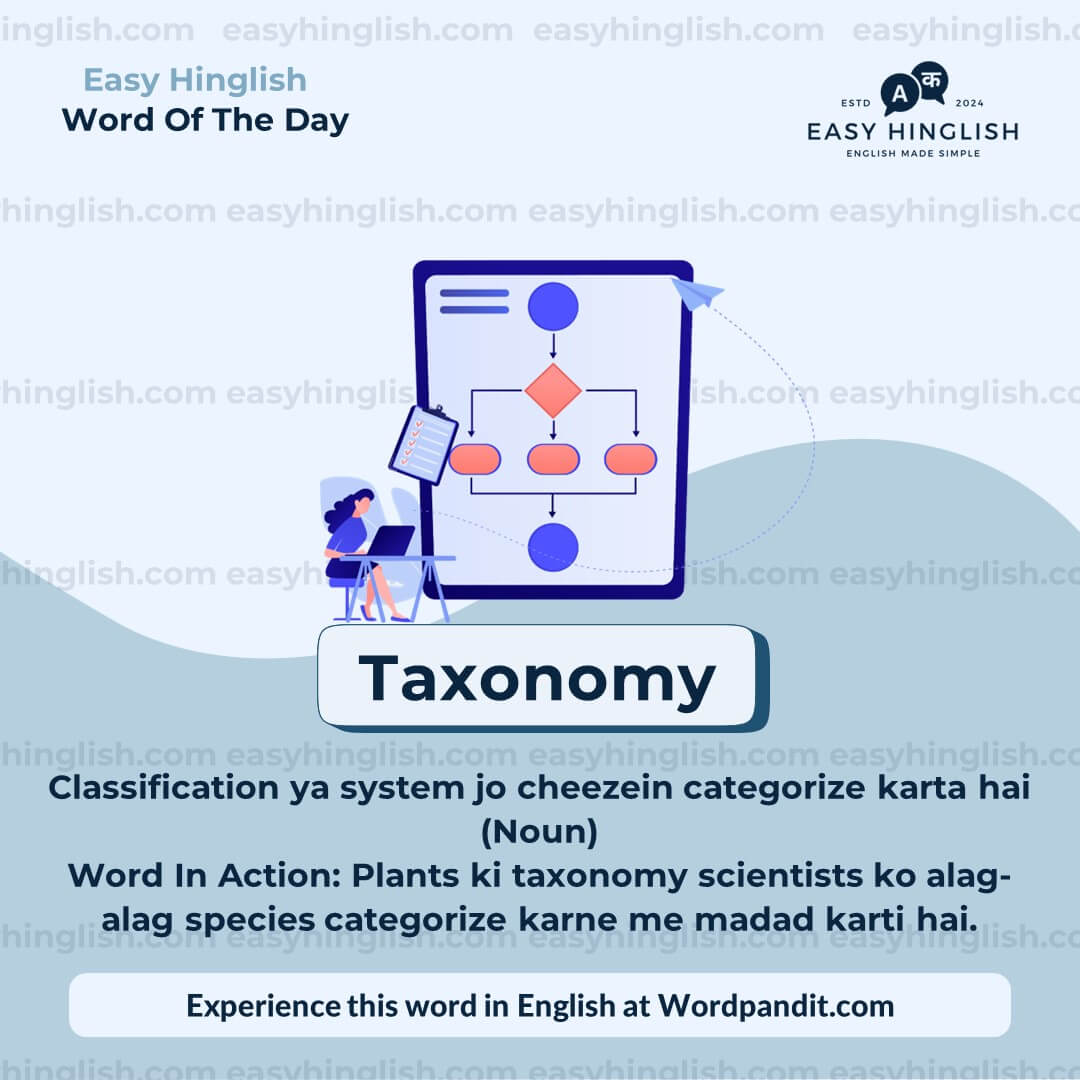Daily Vocabulary International Newspapers aur Publications se Seekho
Wordpandit ke Global Vocabulary Hub ke Saath Apni Vocabulary Expand Karo
Wordpandit par, hum aapko ek truly global vocabulary develop karne me madad karte hain, jo duniya ke sabse respected international publications se li gayi hoti hai. Yeh section aapko naye words se introduce karne ke liye design kiya gaya hai jo global conversations aur trends ko define karte hain.
Global Sources ka Power
Aapko globally sochne aur communicate karne me madad dene ke liye, hum vocabulary curate karte hain world ke top international sources se, jaise:
- The New York Times
- The Washington Post
- BBC
- The Guardian
- The Economist
- Scientific American
- Psychology Today
- Aur bhi bahut saare...
Globally Socho, Competitively Seekho
Hamare daily updates se aap international publications ke naye words seekhoge jo global news aur developments se jude hote hain. Isse aapki vocabulary current bhi rahegi aur globally relevant bhi.
Apni Global Soch Ko Expand Karo
Agar aap international exams ki tayari kar rahe ho, global business communication me excel karna chahte ho, ya sirf apni language skills improve karna chahte ho, toh Wordpandit aapko global level pe grow karne ke liye best resources provide karta hai.
Smart Learning, Global Reach
Hamari learning methodology me global examples, memory aids, aur interactive activities shamil hain, jo naye words ko effectively yaad karne aur real-world me use karne me madad karti hain.
Aaj Hi Apni Global Vocabulary Journey Shuru Karo!
Wordpandit Kyun Choose Karein?
Practical Learning: Aise words seekho jo real-world reading aur communication me aapko sach me kaam aayenge, taaki aapki comprehension aur bolne ki skills improve ho.
Diverse Content: Current affairs se lekar scientific breakthroughs tak, hamare different sources aapko multiple domains ki vocabulary seekhne ka moka dete hain.
Effortless Integration: Wordpandit ko apni daily routine ka part banao. Sirf kuch minute har din dene se aapki vocabulary time ke saath kaafi improve ho sakti hai.
Vocabulary Mastery Tak Ka Aapka Safar
- Regularly hamare Daily Vocabulary section ko visit karo
- Naye words explore karo aur unka context me use samjho
- In words ko apni writing aur bolne ki practice me use karne ki koshish karo
- Jaise-jaise aapke words badhte hain, apni progress ko track karo
Aaj Hi Apni Vocabulary Journey Shuru Karo!
Wordpandit ke saath vocabulary improve karna start karo. Roz thoda effort dalne se aap ek strong vocabulary develop kar sakte ho jo academic, professional, aur personal life me kaafi kaam aayegi.
Yaad rakho, ek naya shabd roz seekhna linguistic limitations ko door karne ka best tareeka hai! Wordpandit ko apni daily learning journey ka sathi banao aur vocabulary excellence ki taraf badho!
WORD-1: Profound (proh-FOWND)
Parichay (Introduction):
"Profound" ek adjective hai jo kisi cheez ki gehrai, intensity, ya significance ko describe karta hai. Yeh knowledge, emotions, ya kisi event ke deep impact ko dikhane ke liye use hota hai.
Example: "To lump or to split? Deciding whether an animal is a species or subspecies profoundly influences our conservation priorities." - Aeon
Is sentence mein, "profoundly" ka matlab hai ki species classification ka conservation efforts par bahut bada asar padta hai.
Vyakhya (Explanatory Paragraph):
"Profound" ka matlab hota hai koi cheez jo deeply meaningful, intense, ya extremely significant ho. Yeh kisi insight, discovery, ya realization ko describe karne ke liye use hota hai jo logon ki soch badal sakti hai.
Shabd ka Arth (Meaning): Deep, intense, ya significant in meaning ya effect (Adjective)
Uchcharan (Pronunciation): proh-FOWND
Mushkil Level (Difficulty Level): ⭐⭐⭐ Intermediate
Shabd ki Utpatti (Etymology):
Yeh shabd Latin word "profundus" se aaya hai, jiska matlab hai "deep" ya "bottomless". Old French mein yeh "profond" bana aur phir English mein "profound" ban gaya.
Samanarthi & Vipritarthi (Synonyms & Antonyms):
Synonyms: Deep, Intense, Meaningful, Insightful, Significant
Antonyms: Superficial, Shallow, Trivial, Insignificant
Vaakyon Mein Prayog (Usage Examples):
- Professor ki lecture ne students par ek profound impact dala aur unki history ki soch badal di.
- Uske words itne profound the ki audience deep contemplation mein chali gayi.
- Yeh novel profound themes explore karta hai jaise love, loss, aur redemption.
- Artificial intelligence ke advancements ne job market mein profound changes laaye hain.
Sanskritik Sandarbh (Cultural Reference):
"The only true wisdom is in knowing you know nothing." - Socrates. Yeh profound statement self-awareness aur knowledge ke endless pursuit ko dikhata hai.
Sochne Wali Baat (Think About It):
Kya tumhari life mein koi aisa profound realization aaya jo tumhari thinking change kar diya?
Ek Chhoti Activity (Quick Activity):
📝 Ek short paragraph likho jo kisi profound experience ke baare mein ho jo tumhari life badal diya.
Yeh Shabd Yaad Kaise Rakhein? (Memory Tip):
🤔 "Profound" ko "Pro" (deep & expert) + "Found" (beyond easy understanding) ki tarah yaad rakho.
Asli Duniya Mein Iska Upyog (Real-World Application):
🌍 "Profound" ka use academic discussions, literature, aur daily conversations mein hota hai jab hum kisi deep thought, powerful emotions, ya significant discovery ko describe karte hain.
WORD-2: Continuum (Kun-tin-yoo-um)
Parichay (Introduction):
"Continuum" ek noun hai jo kisi aise process ya range ko describe karta hai jo gradually change hota hai bina kisi clear break ke. Yeh ek smooth flow ya progression ko dikhata hai.
Example: "The same attitudes that propel a horrific continuum of colonial violence in the Global South propel it on a smaller scale in the Global North." - The Wire
Is sentence mein, "continuum" ka matlab hai ki colonial violence ek ongoing process hai jo sirf time aur location ke hisaab se shift hota hai, lekin completely khatam nahi hota.
Vyakhya (Explanatory Paragraph):
"Continuum" ka matlab hota hai ek aisi cheez jo continuously exist karti hai bina kisi distinct separation ke. Iska use aksar science, society, aur emotions ke changes ya progress ko describe karne ke liye hota hai.
Shabd ka Arth (Meaning): Ek continuous sequence jisme aas-pass ki cheezein clearly different nahi hoti, lekin extremes bilkul alag hote hain (Noun)
Uchcharan (Pronunciation): Kun-tin-yoo-um
Mushkil Level (Difficulty Level): ⭐⭐⭐ Intermediate
Shabd ki Utpatti (Etymology):
Yeh shabd Latin word "continuum" se aaya hai, jiska matlab hai "a continuous whole". Yeh "continere" se bana hai, jiska matlab hai "to hold together".
Samanarthi & Vipritarthi (Synonyms & Antonyms):
Synonyms: Sequence, Progression, Range, Spectrum
Antonyms: Interruption, Break, Gap, Division
Vaakyon Mein Prayog (Usage Examples):
- Human emotions ek continuum par hote hain, jisme happiness aur sadness ke beech kai shades hote hain.
- Social movements ka history ek continuum hai, jisme struggle aur resistance ka silsila chalta rehta hai.
- Language learning ek continuum hai jo basic words se lekar complex sentences tak develop hota hai.
- Climate change ek sudden event nahi, balki ek continuum hai jo kayi decades se chal raha hai.
Sanskritik Sandarbh (Cultural Reference):
"Time is a continuum, with no clear beginning or end, only transitions." - Ek philosophical thought jo batata hai ki time ek non-stop process hai.
Sochne Wali Baat (Think About It):
Kya social change ek continuum hai, ya yeh sudden, defining moments mein hota hai?
Ek Chhoti Activity (Quick Activity):
📝 Teen aisi cheezein likho jo life mein ek continuum ki tarah exist karti hain (jaise knowledge, skill development, ya societal progress) aur batao kyun.
Yeh Shabd Yaad Kaise Rakhein? (Memory Tip):
🤔 "Continuum" ko "Continue + um" ki tarah yaad karo—matlab ek aisi cheez jo bina rukawat ke chalte rahti hai.
Asli Duniya Mein Iska Upyog (Real-World Application):
🌍 Science, philosophy, aur sociology mein "continuum" ka use gradual processes ya transitions ko describe karne ke liye hota hai. Jaise autism spectrum ek continuum hai jisme different neurodevelopmental traits aate hain.
WORD-3: Amateurs (AM-uh-turz / A-ma-TOOR)
Parichay (Introduction):
"Amateurs" ek noun hai jo un logon ke liye use hota hai jo kisi activity ko sirf shauk ya interest ke liye karte hain, bina professional training ya payment ke. Yeh log apne field mein expert nahi hote, lekin unka passion strong hota hai.
Example: "The financial arrangements soon proved inadequate. Set sales were disappointing as amateurs made their own receivers and listeners bought rival unlicensed sets." - Aeon
Is sentence mein, "amateurs" un logo ko refer karta hai jo khud apne radio receivers banate the, bina officially licensed sets kharide, jis wajah se sales par impact pada.
Vyakhya (Explanatory Paragraph):
"Amateurs" ka matlab hai woh log jo kisi cheez ko profession ke taur par nahi, balki sirf interest aur enjoyment ke liye karte hain. Yeh word art, science, sports, aur technology jaise fields mein kaafi common hai.
Shabd ka Arth (Meaning): Koi vyakti jo kisi activity ko shauk se karta hai, na ki profession ke taur par (Noun)
Uchcharan (Pronunciation): AM-uh-turz (American), A-ma-TOOR (British/French influence)
Mushkil Level (Difficulty Level): ⭐⭐ Beginner to Intermediate
Shabd ki Utpatti (Etymology):
Yeh shabd French "amateur" se aaya hai, jiska matlab hai "lover of", jo Latin "amator" (lover) aur "amare" (to love) se bana hai. Pehle, iska matlab hota tha "koi jo kisi cheez ko paise ke bina sirf shauk ke liye kare".
Samanarthi & Vipritarthi (Synonyms & Antonyms):
Synonyms: Hobbyist, Non-professional, Enthusiast, Dabbler
Antonyms: Professional, Expert, Master, Specialist
Vaakyon Mein Prayog (Usage Examples):
- Woh ek amateur photographer hai, lekin uski photos bahut khoobsurat hoti hain.
- Is competition mein amateurs aur professionals dono participate kar sakte hain.
- Usne piano bajana ek amateur ki tarah shuru kiya, lekin ab woh ek skilled musician ban gaya hai.
- Woh amateur detectives case solve karne ki koshish kar rahe the, jabki police already investigation kar rahi thi.
Sanskritik Sandarbh (Cultural Reference):
Pehle Olympic Games sirf amateur athletes ke liye hote the, jismein professional players allowed nahi hote the. Yeh rule baad mein change kiya gaya aur professionals bhi participate karne lage.
Sochne Wali Baat (Think About It):
Kya amateurs kabhi professionals se zyada skill aur creativity dikhate hain? Kyun ya kyun nahi?
Ek Chhoti Activity (Quick Activity):
📝 Koi ek hobby likho jo tum enjoy karte ho. Kya tum uss field mein amateur ho ya professional? "Amateur" ka use karke ek sentence likho jo tumhari experience ko describe kare.
Yeh Shabd Yaad Kaise Rakhein? (Memory Tip):
🤔 "Amateur" ka root word "amare" (to love) hai—matlab ek aisa insaan jo kisi kaam ko paison ke liye nahi, balki sirf pyaar aur interest ke liye karta hai.
Asli Duniya Mein Iska Upyog (Real-World Application):
🌍 "Amateur" ka use sports, arts, aur science mein hota hai. Amateur astronomers ne kuch important discoveries ki hain, jaise naye comets aur planets, bina professional hone ke bhi!
WORD-4: Correspond (Kor-uh-SPOND)
Parichay (Introduction):
"Correspond" ek verb hai jo do cheezon ke similar hone, match karne, ya ek doosre se connected hone ko describe karta hai. Yeh similarity ya communication ko dikhane ke liye use hota hai.
Example: "Kind,’ they argue, is a Biblical classification that corresponds to the modern ‘family’, and not, as you might imagine, to the modern concept of ‘species’." - Aeon
Is sentence mein, "corresponds" ka matlab hai ki Biblical term ‘kind’ ka concept modern scientific ‘family’ se zyada match karta hai, na ki ‘species’ se.
Vyakhya (Explanatory Paragraph):
"Correspond" ka matlab hota hai do cheezon ka similar ya related hona. Yeh mathematics, science, aur daily communication mein kaafi commonly use hota hai. Yeh kisi concept, idea, ya cheez ke beech ek connection dikhata hai.
Shabd ka Arth (Meaning): Match karna, similar ya connected hona, ya ek doosre se agreement mein hona (Verb)
Uchcharan (Pronunciation): Kor-uh-SPOND
Mushkil Level (Difficulty Level): ⭐⭐⭐ Intermediate
Shabd ki Utpatti (Etymology):
Yeh shabd Latin "correspondere" se aaya hai, jiska matlab hai "to answer together". Yeh "com-" (together) + "respondere" (to respond/answer) se bana hai, jiska sense hai "do cheezein ek doosre ko reflect karti hain".
Samanarthi & Vipritarthi (Synonyms & Antonyms):
Synonyms: Match, Align, Equate, Parallel, Coincide
Antonyms: Differ, Contrast, Mismatch, Oppose
Vaakyon Mein Prayog (Usage Examples):
- Mere job responsibilities mere pichle work experience se correspond karti hain.
- Kai languages mein colors ke words English words se directly correspond nahi karte.
- Experiment ke results hamare predictions se closely correspond kiye.
- Woh apne purane college friends se email ke through correspond karti hai.
Sanskritik Sandarbh (Cultural Reference):
History mein, "correspondence" ka matlab letters exchange karna hota tha. Jaise Albert Einstein aur Sigmund Freud ki famous correspondence letters mein war aur human aggression ke nature ke baare mein discussion hoti thi.
Sochne Wali Baat (Think About It):
Kya do concepts correspond kar sakte hain lekin unka meaning alag ho sakta hai, jaise cultural ya language differences ki wajah se?
Ek Chhoti Activity (Quick Activity):
📝 Do aisi cheezein likho jo correspond karti hain lekin bilkul same nahi hain (jaise alag-alag deshon ke time zones). "Correspond" ka use karke ek sentence banao.
Yeh Shabd Yaad Kaise Rakhein? (Memory Tip):
🤔 "Correspond" ko "Co-respond" ki tarah yaad rakho—jab do cheezein ek doosre ke saath match ya align karti hain, toh woh correspond karti hain.
Asli Duniya Mein Iska Upyog (Real-World Application):
🌍 "Correspond" ka use science, mathematics, aur communication mein hota hai. Jaise, geometry mein similar triangles ke angles correspond karte hain, aur business mein salaries experience ke level se correspond karti hain.
WORD-5: Taxonomy (Tak-SON-uh-mee)
Parichay (Introduction):
"Taxonomy" ek noun hai jo kisi cheez ko systematically classify karne ke process ko describe karta hai. Yeh word biology mein bahut common hai, jismein living organisms ko categories mein divide kiya jata hai.
Example: "If Noah had accessed a modern taxonomic catalogue, he might have found himself with a cargo of up to 30,000 varieties of mammal, bird and reptile." - Aeon
Is sentence mein, "taxonomic catalogue" ka matlab hai ek modern classification system jo animals ko organize karta hai, jo Noah ke kaam ko aur complex bana deta.
Vyakhya (Explanatory Paragraph):
"Taxonomy" ka matlab hai kisi bhi cheez ko categories aur subcategories mein systematically divide karna. Yeh sirf biology tak limited nahi hai, balki data organization, knowledge classification, aur product categorization jaisi fields mein bhi use hota hai.
Shabd ka Arth (Meaning): Classification ya system jo cheezein categorize karta hai (Noun)
Uchcharan (Pronunciation): Tak-SON-uh-mee
Mushkil Level (Difficulty Level): ⭐⭐⭐ Intermediate
Shabd ki Utpatti (Etymology):
Yeh shabd Greek "taxis" (arrangement) + "nomia" (method) se bana hai, jiska matlab hai "method of arrangement". Yeh term 18th century mein Carl Linnaeus ne introduce kiya tha biological classification ke liye.
Samanarthi & Vipritarthi (Synonyms & Antonyms):
Synonyms: Classification, Categorization, Organization, Systematization
Antonyms: Disorder, Chaos, Randomness
Vaakyon Mein Prayog (Usage Examples):
- Ek scientist marine animals ki taxonomy study karta hai taaki naye species classify kiye ja sakein.
- Taxonomy ko samajhna biological species ke relations ko analyze karne ke liye zaroori hai.
- Data taxonomy ek important process hai jo digital files aur databases ko organize karta hai.
- Usne music genres ke liye ek taxonomy create ki jo rhythm aur instruments ke basis par classify karti hai.
Sanskritik Sandarbh (Cultural Reference):
Swedish scientist Carl Linnaeus ko modern biological taxonomy ka father kaha jata hai. Unka system aaj bhi use hota hai, jisme organisms ko kingdom, phylum, class, order, family, genus, aur species mein divide kiya jata hai.
Sochne Wali Baat (Think About It):
Kya taxonomy sirf biology tak limited hai? Kya tum ek aisi taxonomy bana sakte ho jo kisi daily life concept ko classify kare?
Ek Chhoti Activity (Quick Activity):
📝 Apni daily life se ek example lo (books, music, ya khana) aur uska ek taxonomy system create karo. Tum categories aur subcategories kaise define karoge?
Yeh Shabd Yaad Kaise Rakhein? (Memory Tip):
🤔 "Taxonomy" ko ek library shelf ki tarah socho jisme har book ek specific category mein sorted hai—yeh systematically cheezon ko organize karne ka process hai.
Asli Duniya Mein Iska Upyog (Real-World Application):
🌍 Taxonomy sirf biology tak limited nahi hai—business, IT, aur research mein bhi iska use hota hai. Example ke liye, online stores apni products ko taxonomies mein divide karte hain taaki customers easily search kar sakein.













